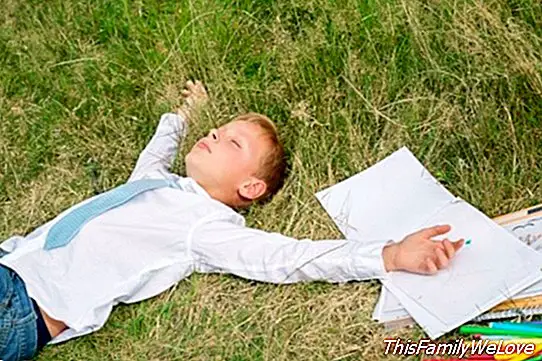Fainting or syncopes in children and adolescents, should I worry?
Yes a son faints The most normal thing in the world is for parents and other family members to be extremely alarmed: it does not seem very normal for a child to have a syncope that makes him fall 'round', however, experts from the Spanish Association of Pediatrics in Primary Care they claim that most of the time these episodes They are benign.
What is a faint?
Pediatricians describe fainting as the sudden loss of consciousness. They usually occur with a fall to the ground. "It's, in a way, a defense mechanism of the organism ", explain the pediatricians, who add that 'syncope' is the medical term of fainting.
"Fainting is more frequent in adolescents than in children ", they comment, while they assure that, although sometimes the syncopes "are dramatic situations", in the majority of the cases they are completely benign.
What is the cause of fainting?
Fainting occurs when not enough oxygen reaches the brain. "For the brain to receive enough oxygen, it is necessary that the nervous system and the circulatory system maintain a normal blood pressure", explained the pediatricians, who added that it is "when there is any alteration of any of these systems" when it can lower the pressure, lower the flow to the brain and cause a faint.
Common situations that cause fainting:
- Tiredness.
- Anxiety, for example, to see blood.
- Extreme heat. Be very hot or feel overwhelmed by being in a place with many people.
- Get up quickly after having been sitting or lying down for a long time.
- Swallow, sneeze, cough.
- Pregnancy.
There are other more serious conditions that can cause fainting:
- Lowering sugar (hypoglycaemia) in a child with diabetes.
- Ingestion of some drugs or drugs.
- Heart disease.
- Anemia.
- Dehydration.

What are the symptoms of syncopes?
We have already said that it is necessary for oxygen to reach the brain. If something fails and this does not happen, our body acts automatically causing changes to try to get oxygen to its destination. These changes are, for example, increase of the respiratory frequence. It is when this is not enough when the person loses consciousness and faints. "It's as if the brain told the body: 'I'm not getting enough blood, so I I'm going to knock you down so that, when lying down, I get more '', exemplify the pediatricians.
Therefore, the symptoms prior to the syncopes are: dizziness, palpitations, weakness, paleness, blurred vision and sweating. After this loss of strength occurs and follows the syncope or fainting, which usually does not last long: in general, people recover their consciousness quickly after lying down.
What do I do if my child faints?
In general, when a person faints he regains consciousness shortly after lying down: in one or two minutes. If it does not happen, we must put you in a position of safety and notify the emergency services.
As we have said, pediatricians say that fainting is not to worry about. "Young people who have had a faint they recover quickly, After lying down for a short period of time, "they insist, although, if the faints are repeated, they do not have a clear cause or the family is worried, what should be done is to go to the pediatrician.
It is also advisable go to the doctor if the fainting appears while the child or adolescent is doing physical exercise or if there is chest pain or palpitations. It is necessary that the experts rule out a possible heart problem.
How can fainting be prevented?
If we know the situations that trigger fainting (closed spaces with many people, see blood ...) what you have to do is avoid them. "It is also advisable to stay well hydrated, especially if the day is hot and physical exercise is done," qualify the experts, who recommend that, before the first symptoms prior to fainting, help the child or adolescent to lie down, preferably with slightly elevated legs.
And if it is not possible to lie down? In these cases the young man should place his head between his legs. "You may also be recommended to do contractions of the muscles, moving the legs or crossing them ", say pediatricians, which indicate that this increases blood flow to the brain, and helps recover quickly.
Do fainting treatments have treatment?
The treatment of fainting is lying down: "Just the fact of lying down makes the majority of children and adolescents recover," say the pediatricians. Of course, when there is suspicion of any disease, the doctor must perform studies to diagnose it. If a disease is determined, the treatment will be the same.
Damián Montero




